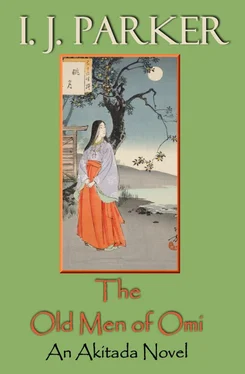I. Parker - The Old Men of Omi
Здесь есть возможность читать онлайн «I. Parker - The Old Men of Omi» весь текст электронной книги совершенно бесплатно (целиком полную версию без сокращений). В некоторых случаях можно слушать аудио, скачать через торрент в формате fb2 и присутствует краткое содержание. Год выпуска: 2015, Жанр: Исторический детектив, на английском языке. Описание произведения, (предисловие) а так же отзывы посетителей доступны на портале библиотеки ЛибКат.
- Название:The Old Men of Omi
- Автор:
- Жанр:
- Год:2015
- ISBN:нет данных
- Рейтинг книги:4 / 5. Голосов: 1
-
Избранное:Добавить в избранное
- Отзывы:
-
Ваша оценка:
- 80
- 1
- 2
- 3
- 4
- 5
The Old Men of Omi: краткое содержание, описание и аннотация
Предлагаем к чтению аннотацию, описание, краткое содержание или предисловие (зависит от того, что написал сам автор книги «The Old Men of Omi»). Если вы не нашли необходимую информацию о книге — напишите в комментариях, мы постараемся отыскать её.
The Old Men of Omi — читать онлайн бесплатно полную книгу (весь текст) целиком
Ниже представлен текст книги, разбитый по страницам. Система сохранения места последней прочитанной страницы, позволяет с удобством читать онлайн бесплатно книгу «The Old Men of Omi», без необходимости каждый раз заново искать на чём Вы остановились. Поставьте закладку, и сможете в любой момент перейти на страницу, на которой закончили чтение.
Интервал:
Закладка:
He discovered that he shared the eastern wing with the male members of Kosehira’s family when he nearly collided with two small boys chasing each other. The first one merely ducked aside and kept going, but his brother stopped and bowed, flushing with embarrassment.
“Your pardon, sir. We were in a hurry because my brother forgot to wear his good robe this morning.”
“Quite all right, son,” Akitada said, smiling and wondering if some special occasion was taking place. “Where would I find your father?” he asked, as the boy started inching past him.
“Oh, he’s in the North Pavilion.”
That was awkward. The northernmost wing of a mansion was usually reserved for the owner’s wives. Akitada resolved to explore the gardens until Kosehira emerged from the company of his ladies, but the boy added over his shoulder. “He’s waiting for you. We’re to have a grand meal today.”
Akitada looked after him and shook his head. Puzzled, he left the gallery for the garden and wandered along moss covered stones in a generally northern direction. He passed a pretty pond with budding water lilies and lotus and saw trees and shrubs blossoming here and there between the pale green leaves. The greenery opened suddenly, and he stopped below a veranda with red lacquered railings and pretty lanterns suspended from the rafters. Children could be heard inside and the softer tones of women’s voices. Akitada turned away, unwilling to offend by entering his friend’s women’s quarters.
But then one of them, a very young and pretty one, looked out and saw him. “Here he is, Father,” she cried, and came out on the veranda, giving him a brilliant smile.
No blackened teeth, Akitada noted with approval, but also regrettably no shyness around strange men. He resolved to have a talk with his own daughter about proper manners for young ladies.
Kosehira joined her, also smiling brightly and waving. “There you are at last. Good morning, Elder Brother,” he shouted. “I was about to go and get you. Come up and meet my ladies and my worthless children. And then we’ll have a proper feast in your honor.”
Akitada’s heart warmed at this invitation. He was being treated like a member of the family while he was here. He went up the steps to the veranda, embraced Kosehira and then walked eagerly into a large room which was filled with women, children, and maids, and where many places were being set with pillows and food trays. When he arrived among them, they all stopped what they were doing and fell silent.
“Hatsuko, Ayako, and Chiyo, come meet Akitada,” Kosehira said. “This is the man I’ve been telling you about all these years.”
Akitada blushed and bowed to three ladies in pretty silks, the oldest his own age, but with a pleasant motherly face, the next perhaps five years younger and plump, and the third a bit younger again and elegantly thin.
Lady Hatsuko, Kosehira’s first lady, wished him welcome, apologizing for the large, noisy family. The other two bowed and smiled.
Then came the introductions of the children, starting with the handsome young men he had met the day before. “Arihito and Arikuni you remember. Arikuni is now at the university. This little one is Arihira, a very good boy, and the baby is Arimitsu.” The “baby”, somewhat out of breath and with his silk robe untied, made a face. He was at least ten and insulted.
Kosehira had not noticed. His face softened as he said, “And these are my little ladies.” He waved five young girls of assorted ages forward. “They are Kazuko, Masako, Motoko, Yoshiko, and Yukiko. No need to mark their names. You’ll see plenty of all my children while you’re here.”
Akitada was still amazed that Kosehira should have grown children. The oldest of his daughters was the one who had announced him, and she looked marriageable. He did remember her name. She was Yukiko and, given her pretty face and sparkling eyes, Akitada guessed that Kosehira would soon see her married off. Or perhaps she already was married. In many of the great families, sons-in-law moved in after marriage. But if she had a husband, he was not here this morning.
Unlike her sisters, who had bowed prettily and silently, Yukiko said, “I’m honored, sir. Our father has told us many stories about your adventures. You have become a hero to all of us.”
Akitada blushed, more furiously than earlier, and gave Kosehira a look. He said, “Thank you, Lady Yukiko, but you mustn’t believe everything you hear. I’m really a very dull fellow.”
And so he was, in truth. But so friendly was Kosehira’s family, and so lively was the children’s chatter, that he soon overcame his awkwardness and joined in the conversation as the maids, assisted by two of the younger girls, brought in a delightful meal of rice gruel with fish and vegetables, a number of elegant side dishes, as well as mochi , nuts, fruit, and chilled juices.
Akitada tried to remember the children’s names and talked to them about his own two and about the games they enjoyed.
Kosehira and his wives smiled as they listened. “You know, Akitada,” Kosehira said, “you should send for them later this month. The great Sanno-Sai Shrine Festival will take place then. There will be a fair, and processions, and a boat race. They’ll love it and can watch with my brood.”
His first lady joined him in urging Akitada to let his children come.
It was a kind invitation and one that Akitada accepted with heartfelt thanks. Yasuko and Yoshi should get along well with Kosehira’s younger children. They had had little joy in their young lives.
It was only later, as he and Kosehira were riding into Otsu to the provincial headquarters, that the conversation turned to matters of provincial security.
“We met a large number of armed monks on our way here,” Akitada said. “I didn’t like their looks. Are they causing problems for you?”
Kosehira rolled his eyes. “Are they! The monks of Enryaku-ji have invited every feckless lout and deserter to join them. Their recruits call themselves lay monks, but they’re just hired thugs. You can’t imagine what they get up to when they spend an evening in town.”
Akitada could. He foresaw awkward meetings with the representatives of the temple. Not that he had much greater respect for Onjo-ji. The whole war had started many years ago when the two religious communities competed for the title of most important Buddhist center in the country. They had busily acquired land and whole villages, all of it tax free, and now had money, power, and influence even beyond those of the prime minister and perhaps the emperor himself. He felt ill-equipped to deal with their current squabble.
But ultimately, he reassured himself, it was just a matter of interpreting the legal documents they would furnish and double-checking the archives. Somewhat cheered he turned his mind to putting the men who had travelled out with him to work. After that, Kunyoshi would be in charge, and he would be free to enjoy his visit with Kosehira and his family.
Chapter Three
They almost arrested old man Juro the next day. That was after they found Wakiya dead in the woods. He had been battered so viciously that he had died in a pool of blood. Animals had gathered to lap up this blood, and crows were waiting in the trees, ready to swoop down for their meal.
But he was found early by his daughter-in-law who had expected him to be lying drunk in a ditch. She had carried the broom with her, intending to make him pay for the inconvenience. Instead, she found his corpse.
The local headman had arrived with his assistant to study the corpse and listen to the daughter-in-law’s complaints about the drunkard’s lack of consideration for his family. She wanted to know who would pay for the funeral and was there perhaps a chance to collect some blood money?
Читать дальшеИнтервал:
Закладка:
Похожие книги на «The Old Men of Omi»
Представляем Вашему вниманию похожие книги на «The Old Men of Omi» списком для выбора. Мы отобрали схожую по названию и смыслу литературу в надежде предоставить читателям больше вариантов отыскать новые, интересные, ещё непрочитанные произведения.
Обсуждение, отзывы о книге «The Old Men of Omi» и просто собственные мнения читателей. Оставьте ваши комментарии, напишите, что Вы думаете о произведении, его смысле или главных героях. Укажите что конкретно понравилось, а что нет, и почему Вы так считаете.












